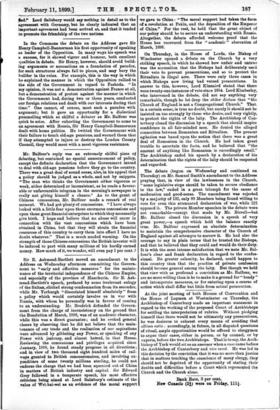Sir E. Ashmead-Bartlett moved an amendment to the Address on
Wednesday afternoon committing the Govern. ment to "early and effective measures" for the mainte- nance of the territorial independence of the Chinese Empire, and especially of the province of Manchuria. Sir E. Ash- mead-Bartlett's speech, prefaced by some irrelevant eulogy of the Sultan, elicited strong condemnation from its seconder, while Mr. Yerburgh "dissociated himself absolutely" from a policy which would certainly involve us in war with Russia, with whom he personally was in favour of coming to an understanding. Mr. Brodrick defended the Govern- ment from the charge of inconsistency on the ground that the Resolution of March, 1898, was of an academic character, while this was a direct guarantee ; and he evoked general cheers by observing that he did not believe that the main- tenance of our trade and the realisation of our aspirations were advanced by gibbeting any Power, or speaking of any Power with jealousy, and almost hatred, in that House. Reviewing the concessions and privileges acquired since January, 1898, he found steady progress in all directions ; and in view of two thousand eight hundred miles of rail- ways granted to British concessionaires, and involving ex- penditure of some twenty millions sterling, he could not endorse the charge that we had been squeezed out of China in matters of British industry and capital. Sir Edward Grey followed in a temperate speech, his most effective criticism being aimed at Lord Salisbury's estimate of the value of Wei-hai-wei as an evidence of the moral support we gave to China : " The moral support had taken the form of a revolution at Pekin, and the deposition of the Emperor of China." For the rest, he held that the great object of our policy should be to secure an understanding with Russia. Altogether, the debate afforded welcome proof that the House has recovered from the " academic " aberration of March, 1898.






































 Previous page
Previous page